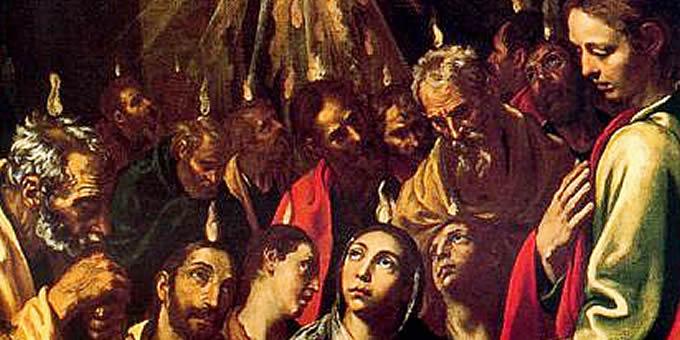Q&A with Jamie Smith on Pentecostalism

Calvin professor of philosophy James K.A. Smith has recently written two books focused on the subject of Pentecostalism: Thinking in Tongues: Pentecostal Contributions to Christian Theology and Science and the Spirit: A Pentecostal Engagement with the Sciences. He recently discussed the tradition's contributions to theology and science.
What inspired you to produce these two books with Pentecostal themes?
My faith journey has been a pilgrimage to the Reformed tradition, and a big part of that was time spent in the Pentecostal corner of God’s kingdom. In fact, as I noted in my Christianity Today article, "Teaching a Calvinist to Dance,” I discovered the Reformed intellectual tradition while also experiencing charismatic renewal, so I’ve always seen the two as not only compatible but complementary in important ways.
In addition to that autobiographical impulse, I’m also very conscious of the fact that the explosion of global Christianity is basically an explosion of Pentecostal and charismatic spirituality. I think it’s important that we take this seriously as Christian scholars, and I hope my work can be of service to my global brothers and sisters.
In the books you make a distinction between “Pentecostalism” and what you call "small-p pentecostalism?” What do you mean by that?
"Capital-P Pentecostalism" usually refers to specific Pentecostal denominations like the Assemblies of God or the Foursquare Church. But other streams of Christian churches are described as "charismatic” and share a lot in common with Pentecostals. Because the nomenclature “Pentecostal-charismatic” is so laborious, some colleagues and I have adopted small-p “pentecostalism” as a shorthand to cover both Pentecostals and charismatics.
What would you say is the pentecostal contribution to Christian philosophy?
Well, so far, not much! But I hope this is a beginning. The whole project was actually inspired by Alvin Plantinga’s important article, "Advice to Christian Philosophers,” which I read while I was in college. In that article—which was his inaugural address at Notre Dame—Plantinga argued that Christian philosophers should have the courage to begin philosophizing from their specific convictions as Christians. I have simply extended Al’s argument and made it more specific: What would it look like for Pentecostal and charismatic philosophers to begin with some of the basic convictions of their unique worldview? Thinking in Tongues tries to answer that question.
I argue that there are unique elements of a pentecostal worldview: an openness to God’s “surprise;” a kind of “enchanted” theology of creation which sees the Spirit continually active in the world; an affirmation of embodiment as seen in the emphasis on physical healing as well as the “physical” shape of charismatic worship; a special place for story, narrative, and testimony in how we know; and a unique emphasis on eschatology and mission. So following Plantinga’s lead, I argue that these elements of a pentecostal worldview would affect philosophical thinking about knowledge (epistemology) and the nature of reality (ontology). So the goal is to explore how a pentecostal starting point makes a difference for philosophical thinking. That’s why, rather playfully, I talk about “thinking in tongues!”
You’ve also just co-edited a related book: Science and the Spirit: A Pentecostal Engagement with the Sciences. Can you briefly describe this book?
For some people, a book on Pentecostalism and science might sound like an oxymoron! But that’s precisely why we launched this project. Both science and Pentecostalism are “globalizing” forces, and while one might expect there to be an inherent tension between the two, we try to show otherwise.
Science and the Spirit grew out of a grant we received from the Templeton Foundation—so the book is the fruit of a multi-year research initiative that brought together a team of scientists, theologians, and philosophers from Pentecostal and charismatic traditions to consider some of the big questions at the intersection of Pentecostalism and science. On the one hand, we wanted to show how and why Pentecostals should engage and pursue science; on the other hand, we also wanted to show that sometimes scientists try to smuggle in assumptions about science that would seem to preclude certain Pentecostal beliefs, such as belief in divine healing or the realities of demons. So the book’s not just about getting Pentecostals to submit to the unquestioned authority of science. We’re also encouraging Pentecostals to think critically about some of the assumptions in the sciences. It’s a two-way street.
How do you see your work on Pentecostalism fitting into Calvin’s Reformed ethos?
I’ve been very encouraged in my work on these themes here at Calvin. At the end of the day, Calvin College is a Christian college in the Reformed tradition, and as such it makes room for Christian scholarship that aims to serve the church as a whole.
I myself am Reformed, but with a “charismatic accent,” you might say. And as I said earlier, I don’t experience any inherent tension between the two. I think both traditions have strengths and can learn a lot from one another. Indeed, we should remember that many of our global sisters and brothers who describe themselves as “Reformed” would look pretty Pentecostal to those of us in North America!






